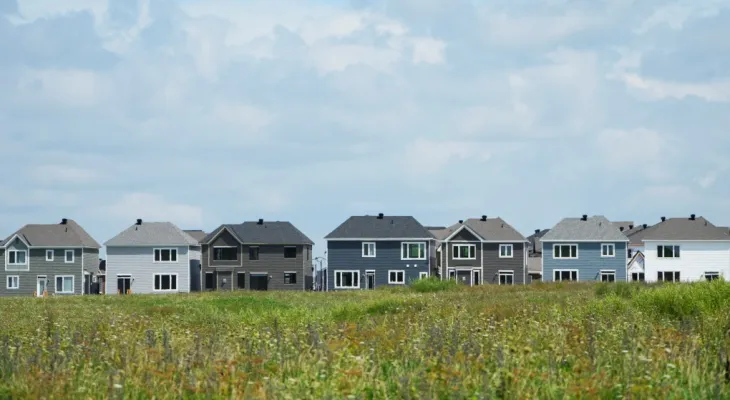Search here
Newspaper
Search here

Arab Canada News
News

Published: October 2, 2023
From the extremely low interest rates that led to a significant increase in demand for properties to the speed at which interest rates rose to levels we haven't seen in a whole generation, it has been difficult to keep up with the changing landscape for mortgage holders.
Now, with increasing expectations that interest rates will remain high for a longer period, many homeowners who have held low-interest rates for years are likely preparing to face financial pain as their mortgage renewal date approaches.
Royce Mendez, managing director and head of macro strategy at Desjardins, wrote in a client note dated September 19: "With each passing month, nearly 2% of mortgage holders are facing renewals at sharply higher interest rates."
Borrowers with fixed interest rates are expected to see an average payment increase ranging from 14% to 25% next year compared to costs in early 2022, according to the Bank of Canada. In 2025 and 2026, payments are expected to rise between 20% and 25%.
Those with variable rates have already borne the burden of higher rates, having seen their payments rise by 49% as of this year.
Borrowers with variable rates but fixed monthly payments will face the largest upcoming increases as some of them have had payments that cover only interest costs or don't even cover that. Individuals holding these products are facing an expected average increase of 44% in payments by 2026 as their mortgage loans reset.
Peter Routledge, head of the banking regulatory authority in Canada, warned in September that this category of borrowers, which totals about $369 billion of the $2.1 trillion outstanding mortgage market, "is at risk of experiencing a significant payment shock," and he hopes to see fewer options available.
In light of the sharp payment increases, banks and other lenders have partially responded by extending amortization periods to reduce monthly payments.
More than 46% of Canadian mortgages have repayment schedules longer than 25 years as of the second quarter, according to the Bank of Canada, a figure that has steadily risen from about 32% in the summer of 2020.
Many of the mortgage amortizations at Canada's largest banks now extend beyond 30 years, ranging from 24% of mortgages at RBC to 30% at BMO, with the vast majority exceeding 35 years. CIBC and TD Bank fall somewhere between the two, while Scotiabank is noted for having only 1% of mortgages extending over 30 years.
The banking regulator has also raised concerns about these extended mortgage terms, which slow the rate at which people build equity in their homes. Lenders are also looking to reduce long-term mortgages, as most reported in the last quarter that they cut 1 or 2 percentage points from the total of a 30-year mortgage.
With stretched amortizations declining, borrowers may have to provide a lump sum or increase their monthly payments to get their loans back on track, which the regulator suggests as preferred options.
However, obtaining funds may be difficult for many, as cracks are starting to appear in credit markets.
Seamus Pinroy, a housing research specialist at Canada Mortgage and Housing Corporation, stated: "Your car loans, your credit cards, your lines of credit, and delinquencies in these products are on the rise."
According to Megan Hastings, CEO of The Mortgage Coach financial brokerage, "Borrowers unable to manage higher payments or who don't have available cash for a lump sum will have to consider all available options."
She said she has heard from clients who were surprised to learn how high interest rates were, especially since they have to pass a stress test on the mortgage if they want to switch lenders. "The test is pushing more borrowers into the alternative lending market," she added. "They have good credit, they have good income. But that qualification is what drives them to the alternative space."
Hastings added that while the cost of alternative products is generally higher, there is an increasing number of options in that space.
"Sometimes, there are solutions that can help them get through the hardest 18 to 24 months, you know, across the hardest region or hardest times."
Hastings stated she expects some housing investors to offload some apartments due to financial pressures, but overall, most homeowners will do what it takes to keep their properties, whether that means selling their cars, getting another job, or anything else they can figure out.
"Canadians, in general, will do their utmost to keep their homes. We love being homeowners."
Comments